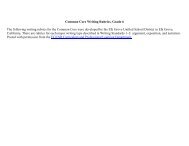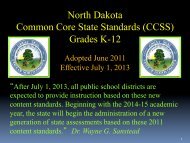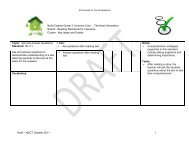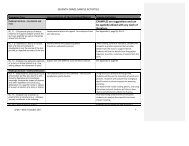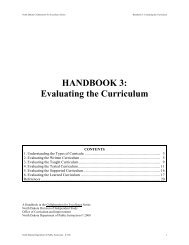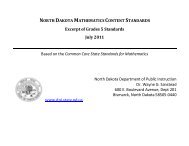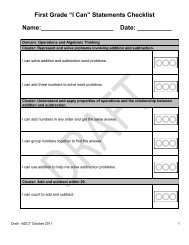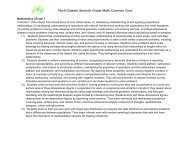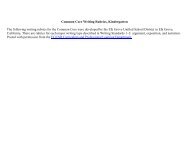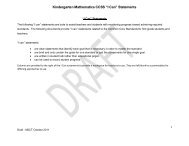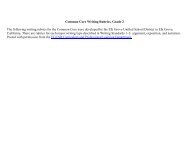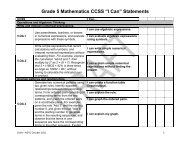North Dakota First Grade Common Core - ND Curriculum Initiative
North Dakota First Grade Common Core - ND Curriculum Initiative
North Dakota First Grade Common Core - ND Curriculum Initiative
Create successful ePaper yourself
Turn your PDF publications into a flip-book with our unique Google optimized e-Paper software.
<strong>North</strong> <strong>Dakota</strong> <strong>First</strong> <strong>Grade</strong> <strong>Common</strong> <strong>Core</strong>!The Next Generation<br />
Strand: Language<br />
Cluster: Conventions of Standard English<br />
Topic: Capitalization, Punctuation and<br />
Spelling<br />
Standard: L.1.2<br />
Demonstrate command of the conventions<br />
of standard English capitalization,<br />
punctuation, and spelling when writing.<br />
a) Capitalize dates and names of<br />
people.<br />
b) Use end punctuation for sentences.<br />
c) Use commas in dates and to<br />
separate single words in a series.<br />
d) Use conventional spelling for words<br />
with common spelling patterns and<br />
for frequently occurring irregular<br />
words.<br />
e) Spell untaught words phonetically,<br />
drawing on phonemic awareness<br />
and spelling conventions.<br />
I Can:<br />
• Capitalize dates and names<br />
• Use end punctuation for sentences<br />
• Use commas in dates and lists<br />
• Spell sight words and word family<br />
words<br />
• Use invented spelling<br />
Notes:<br />
Tasks:<br />
• To teach the use of a comma in a series, list the<br />
five senses on the white board. Give students a<br />
“setting” card (e.g., zoo, farm, or beach) and have<br />
them dictate a sentence using one of the senses,<br />
naming three things they are able to use one of<br />
the senses for, in that setting. Explain that when<br />
we use the word “and” we are using a conjunction.<br />
For example, “At the zoo, I smell popcorn,<br />
elephants, and cotton candy.” Write the dictated<br />
sentence and then challenge them to write their<br />
own sentences.<br />
Source: commoncore.org<br />
• To introduce the relationship between punctuation<br />
and reading expression, use the book Yo! Yes?<br />
Show the students the cover of the book with its<br />
very simple title: Yo! Yes? Ask how someone<br />
would say those words? YO! YES? As you read<br />
the book with the students, have the boys read<br />
one page, and the girls the opposite page. As they<br />
focus on the illustrations and the way the author<br />
ends each sentence, they will know how to read<br />
the words, and a story will be created in their<br />
minds. Follow this reading with other books so<br />
that the children learn how important it is to read<br />
with the end punctuation in mind.<br />
Source: commoncore.org<br />
Draft - <strong>ND</strong>CT August 2011 40



